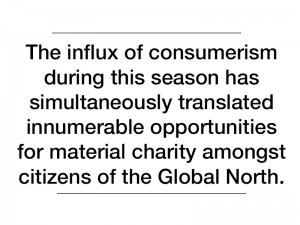With the popularity of the term ‘peace’, there seems to be a rather simplistic or impersonal understanding for its potential significance in daily life. For example, my early understanding of peace was limited to it being a lack of explicit violence and conflict altogether. Further contemplating the nature of peace during my time at Houghton has challenged me to view reconciliation as a means to peace, moving beyond considering only the explicit indicators of violence and conflict. While studying ideals of peace in the classroom, however, there had been a disconnect between my thought process and my daily actions. I wanted to implement reconciliation and sustained peace in my personal life but lacked a heartfelt understanding of how to do so.
 There has been some recent media attention on reconciliation in the nation of Rwanda as April 7 commemorated twenty-years since the 1994 genocide. In reflecting upon the last twenty years in Rwanda, my perceptions of reconciliation have been transformed, challenging me to more personally consider the deep nature of peace through reconciliation as a transformative process for both individuals and communities. This transformation began in the spring of 2013 as I had the opportunity to study in Rwanda through the GoED study abroad program. Classes during this semester included a study of Rwanda’s extensive history, highlighting the continual reconciliation process since 1994. In April 1994, approximately 800,000 to 1,000,000 people were killed within 100 days as a result of a complicated political, social, and historical conflict. Hearing first-hand accounts from survivors of the genocide began to stir difficult questions in my mind, challenging my reflection upon an individual’s reconciliation and peace building processes. A specific story of continual transformation between two Rwandan individuals has particularly influenced me in my daily reflections.
There has been some recent media attention on reconciliation in the nation of Rwanda as April 7 commemorated twenty-years since the 1994 genocide. In reflecting upon the last twenty years in Rwanda, my perceptions of reconciliation have been transformed, challenging me to more personally consider the deep nature of peace through reconciliation as a transformative process for both individuals and communities. This transformation began in the spring of 2013 as I had the opportunity to study in Rwanda through the GoED study abroad program. Classes during this semester included a study of Rwanda’s extensive history, highlighting the continual reconciliation process since 1994. In April 1994, approximately 800,000 to 1,000,000 people were killed within 100 days as a result of a complicated political, social, and historical conflict. Hearing first-hand accounts from survivors of the genocide began to stir difficult questions in my mind, challenging my reflection upon an individual’s reconciliation and peace building processes. A specific story of continual transformation between two Rwandan individuals has particularly influenced me in my daily reflections.
On a particularly sunny day in February 2013, the ten other GoED students and I sat under the tin roof of our outdoor classroom in Kigali (the capital city of Rwanda). We were introduced one-by-one to John and Grace*, two middle-aged Rwandan citizens who had come to share their personal experiences of reconciliation since April 1994. Awaiting details of their stories, I noticed the deep scar across Grace’s face and the absence of her right hand, prefacing the depth of her and John’s accounts.
On April 29, 1994 John violently attacked Grace after committing a series of murders amongst a group of soldiers and civilians. John killed the baby on Grace’s back and maimed her, assuming that she was left for dead. Grace, however, survived and remained in a small Rwandan hospital for nearly two months. During the numerous days she recovered in the hospital, Grace was overwhelmed with despair, crying out angrily to God and grappling with difficult questions she has yet to fully answer. Within her questioning, Grace began the long journey of healing as she prayed for strength to forgive whoever her perpetrator had been.
Grace longed to know inner and communal reconciliation in the years following the genocide. She became a respected member of her community and was provided opportunities for leadership. In 2001, Grace became a community representative for May Truth Prevail, an organization established to facilitate the reconciliation of perpetrators with genocide survivors and/or their families. While seeking reconciliation with another man through this organization, John came upon Grace for the first time since 1994.
Having long desired reconciliation for his previous actions, John knew he needed to reveal the truth and confront his aggressions towards Grace, who did not initially recognize John as her perpetrator. John approached Grace with a burdened heart, seeking forgiveness. After John served a prison sentence, he and Grace began working together in a May Truth Prevail village, created for survivors and perpetrators to reconcile their relationship while living as neighbors. They expressed the difficult process of continual healing in the hopes of building a greater trust. Such a process entails great sorrow and bravery while instilling a reconciled hope for peace. Stories like John and Grace’s are coming out throughout Rwanda during this commemorative month of April. They represent opportunities and challenges for reconciliation amidst rather complicated situations related to the genocide.
Throughout this month of April, global citizens reflect upon the twenty years since the Rwandan genocide, highlighting the resilience of Rwandans like Grace and John who continue to confront internal and external aspects of trauma, preventing further conflicts in their day-to-day lives. In essence, Grace and John’s process of reconciliation gives testimony to the restoration of humanity through healthy relationships. Such healthy relationships entail healthful conflict resolution, respect, self-reflection, and trust. In this perspective, I have begun to re-conceptualize reconciliation as related to a deeper understanding of peace known as “positive peace”.
Positive peace challenges individuals to recognize any areas of tension in their life in order to self-reflect and confront implicit and/or explicit conflicts in a healthy manner. In seeking positive peace, the well being of an individual and/or community should not be prioritized at the expense of another, highlighting broken relationships as foundational to implicit and explicit conflicts. Positive peace often requires the contemplation of uncomfortable truths and action in order to confront associated brokenness. Confronting the underlying areas of tension within the here and now requires a bravery in seeking to heal broken relationships, often entailing systemic, environmental, psychological, physical, emotional, spiritual, interpersonal, and/or intrapersonal transformations. Positive peace prioritizes a truthful relationship with God and oneself, further allowing for healthy reconciliation with elements that may be beyond oneself.
While the context of Rwanda remains different from Houghton, human brokenness and the pursuit of positive peace have continual relevance to daily life at Houghton College. Reflecting upon the example of John and Grace, I can’t help but be challenged by a deeper conceptualization of peace and reconciliation in the here and now.
*note: individual’s names have been changed for their privacy.

